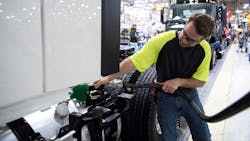Volvo Trucks North America and Mack Trucks now are fueling newly assembled trucks with hydrotreated vegetable oil (HVO) in a bid to boost sustainability and reduce reliance on fossil fuels. Volvo Trucks is using HVO in Class 8 vehicles departing its New River Valley assembly plant (NRV) in Dublin, Virginia; and Mack is using HVO to move tractors off its Lehigh Valley (LVO) production line in Macungie, Pennsylvania.
This initiative is part of the manufacturers’ plans to “decarbonize the industry” by enhancing internal combustion engine efficiency, scaling battery-electric vehicle production, and developing hydrogen fuel cell trucks.
NRV produces all Volvo trucks for the North American market, and LVO produces all Class 8 Mack trucks for North America and export markets.
“Today and for the foreseeable future there will not be a one-size-fits-all approach to decarbonizing transportation,” Peter Voorhoeve, Volvo Trucks North America president, said in a news release. “That is why, at Volvo Trucks, we are focused on the three-pillar strategy with battery electric, hydrogen fuel cell, and renewable fuels in the internal combustion engine. With the all-new Volvo VNL and by utilizing HVO, we can make the most substantial and immediate impact today. There is a future for the ICE and we’re happy to be doing all factory fills with renewable fuel, an important step towards walking the talk in our sustainability journey.”
HVO is a renewable fuel that can be used in the same engine as fossil-based diesel without requiring engine modifications. Produced from renewable sources such as waste vegetable oils and animal fats, HVO has the same chemical structure as fossil-based diesel so it can be used as a direct replacement to reduce greenhouse gas emissions while maintaining engine performance. By utilizing these waste products as feedstocks, HVO production can promote a more sustainable circular economy by converting waste into valuable fuel.
Sophisticated hydrotreatment
Unlike first-generation biofuels, these raw sources are processed using a sophisticated hydrotreatment to achieve high levels of purity allowing HVO to be stored, used, pumped, and handled virtually the same way as fossil-based diesel products, Volvo said. Because HVO is hydrogenated it doesn’t contain oxygen and does not present the challenges of first-generation biofuels, including biodiesel, relating to extreme temperature and storage. This is an added benefit of HVO as it does not require separate storage or fueling infrastructure. HVO, often referred to as renewable diesel, can be used interchangeably with petroleum diesel. Renewable diesel at any blend up to a maximum of 100% (RD100) that conforms to ASTM D975 or EN15940 will not adversely affect engine or aftertreatment performance or durability.
Volvo Trucks is fueling new trucks leaving the NRV plant with 20 to 25 gallons of HVO per tank, with full tanks provided for trucks destined directly to customers. This initiative is expected to replace 1,125,000 gallons of fossil-based diesel annually, achieving an estimated 75% to 85% reduction in CO2 emissions for Volvo Trucks' operations in North America.
Decarbonization advancement
Mack estimates utilizing HVO at Lehigh Valley is reducing carbon emissions there by 18%. The Mack MD Series is produced at Roanoke Valley in Salem, Virginia, where the OEM plans to begin using HVO later this year.
“The utilization of HVO will help Mack in its journey to promote the decarbonization of the transportation industry,” said Jonathan Randall, president of Mack Trucks North America. “Whether it’s through the use of HVO, or through the development of Mack battery-electric vehicles (BEVs), such as the Mack LR Electric refuse and Mack MD Electric models, Mack is committed to reducing its carbon footprint and achieving our sustainability goals.”
